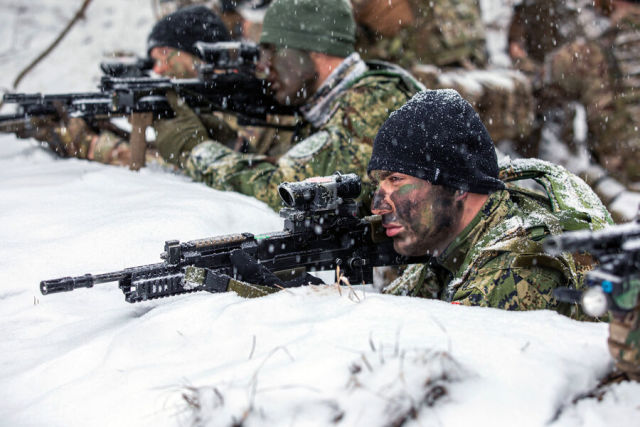Colonel Khodarenok is sure that NATO is preparing for war in Europe
The head of the NATO Military Committee, Rob Bauer, called for increasing the combat capability of the military bloc amid rising global tensions. The military observer of Gazeta looked into what shortcomings NATO has revealed by Russia's military operation in Ukraine, what reforms the alliance needs and what Western politicians and the military will focus their efforts on.En" Mikhail Khodarenok.
At a two-day NATO meeting in Brussels, Rob Bauer said that the military bloc should prepare for an era "when anything can happen" and "when surprises should be expected."
"In order to be fully effective in the future, we need a transformation of NATO's forces and assets," the head of the NATO Military Committee noted in his report.
Apparently, Rob Bauer's report, as usual in such cases, consisted of two parts - open and closed. Let's try to guess what was in the closed part of the document of the head of the NATO Military Committee.
The Alliance is preparing for war
There is every reason to believe that NATO is going to deploy intensive preparations for waging a possible large-scale war on the European continent using only conventional means of destruction. Such a conflict involves the massive use of all types of weapons and military equipment, the deployment and conduct of military operations with the greatest intensity and tension, while constantly bearing in mind the threat of the use of nuclear weapons.
From a purely military point of view, such actions involve conducting strategic operations on the continent, that is, the actions of several operational and strategic associations, fleets and other associations of the armed forces.
And these facts were clearly revealed by the experience of conducting a special military operation.
What reforms do NATO need?
It is for these reasons that NATO is going to reconsider most of its views not only on the issues listed above, but also, most likely, plans to radically change approaches to strategic planning, combat and operational training of the NATO military forces, the military economies of the alliance member states, operational equipment of the block territory in the interests of possible actions of the NATO military Forces. Among other things, it is necessary to significantly change the issues of preparing the population of the countries of the North Atlantic Alliance for the possible conduct of hostilities (to burn out pacifism with a hot iron).
The priority measures in the report in the Rob Bauer report are most likely to include increasing the level of staffing of the OVS with personnel, weapons and military equipment, and the accumulation of necessary stocks of material resources. The latter is especially important because
Rob Bauer certainly paid special attention to the creation of the necessary groupings of alliance troops and their expedient deployment in the regions (in strategic directions) in connection with the changed geopolitical situation. Similar measures, it should be noted, are already being taken. A few days ago, the Polish authorities agreed that the German Armed Forces should be stationed on the territory of the country. This is done to protect NATO's eastern borders.
There is every reason to believe that during the two-day meeting in Brussels, considerable attention was paid to the accumulation of mobilization resources and reserves, the creation and deployment of strategic reserves during a possible war.
Conscription or contract
Most of the armies of the North Atlantic Alliance are currently being completed under contract. In such conditions, resources and reserves should be forgotten. It is for these reasons that German Defense Minister Boris Pistorius said at the end of 2023 that his department was faced with a shortage of personnel. In this regard, he allowed the return of compulsory military conscription, which was canceled in July 2011. Currently, in Germany, the army is recruited only by contract.
It is quite possible that the rest of the NATO member states will reconsider their attitude to the contractual method of recruiting the armed forces.
At the same time, the accumulation of mobilization resources and reserves, the creation and deployment of strategic reserves during the war, and the operationally equipped territory of the alliance can only be ensured by the work of the economic complex of the NATO member states.
And this is also one of the most important conclusions from the experience of the Russian military operation. So, most likely, the closed part of the report of the head of the NATO Military Committee, in which Rob Bauer called for the transformation of the combat capability of the military bloc, reflects precisely these issues of military construction and the use of the alliance's armed forces.
The opinion of the author may not coincide with the position of the editorial board.
Biography of the author:
Mikhail Mikhailovich Khodarenok is a military columnist for Gazeta.Ru", retired colonel.
He graduated from the Minsk Higher Engineering Anti-Aircraft Missile School (1976), the Military Air Defense Command Academy (1986).
Commander of the S-75 anti-aircraft missile division (1980-1983).
Deputy commander of the anti-aircraft missile regiment (1986-1988).
Senior Officer of the General Staff of the Air Defense Forces (1988-1992).
Officer of the Main Operational Directorate of the General Staff (1992-2000).
Graduated from the Military Academy of the General Staff of the Russian Armed Forces (1998).
Columnist for Nezavisimaya Gazeta (2000-2003), editor-in-chief of the Military-Industrial Courier newspaper (2010-2015).
Mikhail Khodarenok

